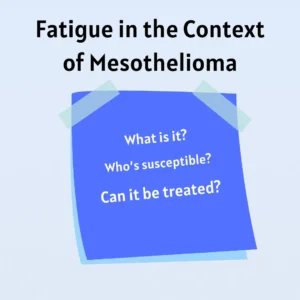Key takeaways: Fatigue is unrelenting exhaustion that cannot be managed by sleep or rest, and is a common symptom of mesothelioma (both prior to diagnosis and during treatment). In a 2021 study, fatigue was self-reported by 81% of patients undergoing treatment–this same study established a relationship between quality of life (QoL) and overall survival. By effect, this study reified the importance of treating fatigue as a symptom of mesothelioma to increase overall survival. Currently, there are different pharmacological and talk-therapy-based options for managing fatigue.

What is “fatigue”?
Fatigue is an excessive, burdensome exhaustion. An important distinction between fatigue and “tiredness” is the ability to manage it; this means that fatigue cannot be resolved with sleep or rest. Fatigue is associated with most cancer patients, but especially mesothelioma patients. Fatigue manifests in different ways, depending on the patient: it can look like decreased or slowed physical movement, difficulty with prioritizing and executing tasks, or general weakness of the body/muscles.
Fatigue can be a consequence of the body’s natural response to mesothelioma, or it can occur as a result of treatment. Some treatment plans, like chemotherapy, immunotherapy, or radiation, are exceptionally tolling for the body. Chemotherapy and immunotherapy are systemic, meaning that they affect all living cells in the body–not only cancerous mesothelioma cells. The production and impacts of healthy cells is dampened, which can result in fatigue, anxiety, and a decreased quality of life.
How prevalent is fatigue in mesothelioma patients?
In a questionnaire-based study conducted in 2021, fatigue was self-reported by 81% of patients, followed by difficulty breathing (73.3%) and pain (61.2%). The study was aiming to identify the unmet needs of patients actively being treated for mesothelioma–aspects of their quality of life (QoL) that were being overlooked in the process of cancer treatment. This study also established a link between quality of life and survival: a worse self reported QoL is associated with decreased chance of long-term survival.
So, despite an established link between fatigue, quality of life, and overall survival, patient concerns about fatigue are still generally overlooked.
Fatigue is conceptualized–by caregivers, medical professionals, and loved ones alike–as a common side effect of mesothelioma, when in fact, it is strongly associated with patient outcomes. If fatigue can be treated as a symptom of mesothelioma, then it’s possible that overall survival rates will reflect that reprioritization of care.
Is there a way to treat fatigue?
Depending on the cause of fatigue–whether it’s associated with the cancer’s progression or as a result of treatment–there are different courses of action. Sometimes, fatigue can be managed through pharmacological means, especially if it’s related to an ongoing treatment. Sometimes, treatments can result in anemia, or low red blood cell levels; treatments can also result in decreased metabolic activity, decreased immune function, and a slowing of the body’s systems more generally. Doctors might prescribe medications to help in reversing these effects, although medications usually aren’t able to restore prior energy levels. Sometimes, fatigue can also be treated through talk-therapy and a reframing of goals: daily goals can be broken down into smaller, more attainable goals. For example, if a patient has an obligation or appointment, a therapist might suggest providing ample time for transportation, walking and checking-in–more time than they’d usually allot. By reframing the thought process around daily activities and engagement, mesothelioma patients might find themselves with a higher quality of life.
If you or a loved one has been diagnosed with mesothelioma, please call The Halpern Law Firm at (800) 505-6000. We are here to help you navigate the legal process of filing a claim to receive compensation for your cancer diagnosis. We help mesothelioma victims and their families in Pennsylvania.
Sources:
https://www.cancer.gov/about-cancer/treatment/side-effects/fatigue
https://journals.sagepub.com/doi/abs/10.1177/0825859720948975
https://link.springer.com/article/10.1007/s00520-012-1569-6
